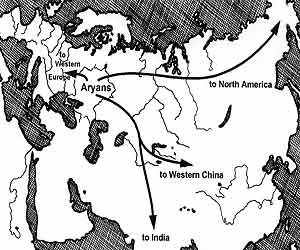 The political organization of Aryans can be traced in some of their legends on the origin of government. The gods and the demons were at war with each other where the gods were losing. Hence they assembled together and elected a king for themselves who would lead them. Upon doing so they won the war. Similar legends resembling the former one gradually fabricated the idea of kingship.
The political organization of Aryans can be traced in some of their legends on the origin of government. The gods and the demons were at war with each other where the gods were losing. Hence they assembled together and elected a king for themselves who would lead them. Upon doing so they won the war. Similar legends resembling the former one gradually fabricated the idea of kingship.
The tribes were formed as patriarchal groups and in the earlier the chief of the tribe was simply the tribal leader. As the requirement for security grew, the most competent defender was elected for the post of the chief. He gradually began to be entitled to the privileges usually associated with those of kingship. The rapid development of monarchies was kept under control but by the formation of two tribal assemblies, the sabha and the samiti could not be checked. The sabha was the council for the tribal elders and hence was more exclusive. The samiti on the other hand was a general assembly of the entire tribe. The tribal groups which did not have any elected monarch these assemblies exercised the functions of the government and authority. Such tribal groups were by no means rare. Political units are liable to be of smaller units particularly when they were kingdoms as the king was largely a tribal chief with special powers.
The Vedic king was primarily a military leader. His display of skills in war and the safeguarding the tribe was essential was essential for upholding his position. He received voluntary gifts in kind but neither did he have the authority to claim any regular tax nor he could have any rights over the land. He had the right to claim a portion of the booty from successful cattle-raids. In the religious field earlier his role was almost negligible as the functions of the priest were quite elaborate but with time there was a change in the position of the king. This change took place chiefly because of the emergence of the idea of divinity in kingship. According to a later legend the gods not only elect a king for leading them to victory but also the king was endowed with certain distinguishing attributes. Special sacrifices were conducted to confer divinity on the king. Such sacrifices were conducted by the priests who acted as intermediaries between men and gods. Gradually the custom of kingship had become hereditary. The status of the sabha and samiti also experienced a significant change. They had the authority to act as checks on the king, but the king was the final authority.



















